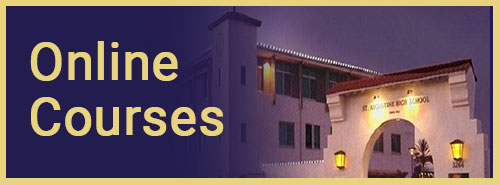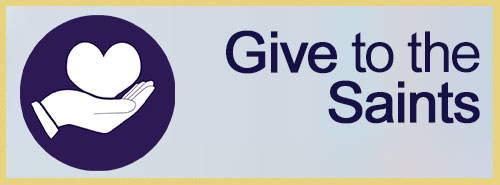Your Excellency, Bishop Maher, Father Provincial, Chairman of the Board of Supervisors, Ladies and Gentlemen:
There is no more exhilarating duty of humanity than the obligation of knowing and expressing gratitude. Over and over, St. Paul admonishes the faithful “Grati estotebe ye thankful.” I know no better starting point for my remarks today than to follow the Pauline injunction. First, I owe the Board of Trustees and the Principal of St. Augustine High School more than casual acknowledgment for the delicacy of their tribute – the library having stood at the peak of my pre-occupation for almost twenty years here. After fifteen years, I was able to house the book collection in a respectable wing of the main building. The gem-like new facility is a resplendent achievement. Let me here express a personal sense of gratitude to the many who by their contributions make us their debtors.
On this afternoon heavy with reminiscence, my mind roves over the personnel, past and present, who made the several libraries living institutions. I begin with Patrick Wolff and the devoted hours he gave for many years. In time I was able to bring in the first professional librarian, June Grande. As a library aid, Marilyn Irving made her special contribution. For – years –gave her devoted service. The present librarian, Ursula Sasso brings to her task the demands of professional librarianship. For many years Jackie Carter has combined deft management of students and cooperation with Ursula. Lest anyone think that Father Wasko was content to supply funds to the library, it should be noted that among other things this new facility is a monument to his unfailing good taste.
It is good to be in a place of friends, those known and loved for many years, those of the more recent past. In all of you who are here as friends of the library, there is the tangible presence. But for me there is a teeming invisible presence, moments, characters, the crowded galaxy of those who await discovery or renewal of discovery on the bookshelves. To come into a rich library at night, one can fantasize, is to renew acquaintances with countless men and women we once met there. The shrewd little vintner with his gentle mocking of fellow pilgrims to Canterbury gathering then in a glorious medieval tapestry. The incredible outpouring of poetic and dramatic character which makes Shaespeare the world’s undisputed creative master. Dr. Johnson, the pathetic, the bellowing, the caustic, the compassionate, steps out of Boswell to converse with us. John Keats dying shout of the beauty he wanted to express in faultless lines. The great organ voices of the major poets and the plaintive flute of the minor poet.
Perhaps the most varied of all the voices is the chorus that rises from the long panorama of the novel – that faithful illumination of the human condition. Tom Jones of the comic epic, Scott’s crowded world, Jane Austin people of sense, and best of all the microcosm of Dickens. All our sorrows, dashed hopes, moments of glory, the heroism of our race, the sudden shattering intrusion of God into human affairs – all that we identify as our life is illuminated in a unique fashion by these creatures of the pages who rest on the shelves so quietly until a mind enmeshes with them and they assume renewed life.
Yes, we find on library shelves a goodly company of friends, gained once and never lost. A library is a kind of university as Cardinal Newman envisioned the university: a place which professes all knowledge – sacred and secular. Perhaps we should call it the poor man’s university. Here you have your departments of biological sciences, physical sciences, mathematics; alongside literature, history, political theory. And always a section of divinity. The same theoretical premises holds for both library and university: it must comprise to whatever depth is appropriate, the full range of knowledge without regard to the fashions of the moment. In the library, unlike in certain university departments it would be rare for Descartes to elbow off the shelves a treatise on new mathematics…The library is a little university without hubbub.
If I enter at this point upon a new spirit of commentary which seems highly personal, you must realize that my relationship to the growing book collection in the late 1940’s and the 1950′s was that of parent to child. Every volume was my choice. And in those sixteen years, I chose over 7000 volumes. The loss of this unique collection is a personal tragedy.
How remote the middle 1940’s when I was the English department at Saints! I was also by accident the architect of the slowly emerging book collection. Every library grows out of a philosophy of book selection. This one grew out of my conviction that a true English education began in the classroom but was augmented by outside reading. Of the two paths of instruction, I regard the latter as the more effective. That conviction made the gathering of a considerable body of books suitable for all classes in their reading program imperative.
Had you passed by my classroom in early September of those years in the 1940’s you might have heard sounds that ran from low moans to cries of outrage as I announced the reading requirements: eight books a year and a substantial written report on each. (For extra credit an additional four books.) There was some rebellion, some stupefaction. For some, the program would not succeed. They were hardened non-readers. For most, however, it was not an impossible ideal and they read and read. For the very bright it was a time of joyous discovery. Long after I had left Saints, and to this day, I have testimony of the profound effect which has carried a mentality into their lifetime.
The immediate necessity to provide in their own high school environment a collection to feed this substantial consumer group shaped the early library at Saints. In time other components would be added: reference, history, biography, literary criticism, science, mathematics, music, the arts. I saw early that the library had to provide resources for teachers as well as students and the selection of more mature studies answered that need.
I was one of those teachers and was under pressure to know all the books I was assigning to students. For I did make the assignments – individual by individual – each month, knowing both the book and the student. To this library then I owe much of my own development as a reader. It would be tedious to go into great detail of how the growing collection opened continuing vistas for me. I recall some highlights.
There was foremost Kristin Lavransdatter, the long saga set in Christian Norway of the Middle Ages. All the passion, the anguish, the slow wisdom of human experience is there and the reader is drawn into it. At the end of the book one feels he has lived the full seventy five years of Kristin’s life and gained a measure of her wisdom.
Anna Karenina by Tolstoi has similar impact. Beautiful, willful, loving Anna defies moral order and the social structures of Czarist St. Petersburg only to invite the slow deterioration and tragic end which Tolstoi demonstrates as God’s avenging evil. Among moderns, Graham Greene writes somber reflections in the form of the novel, a world in which conscience is the ruthless pursuer of men and women. Perhaps The Heart of the Matter best illustrates the world of Greene more full of shadow than light, of evil than good, but always under the dominance of pity.
The library provided volumes by which I expanded my reading of G.K. Chesterton, begun long before. This rollicking giant of a man, wit and laughing philosopher, champion of Catholicism in England, wrote in a style flashing with lightning. It appeared to be a series of roman candles in the night but in fact was a steady stream of rockets aimed at the forces of evil.
No one group did more to shape my mind than the poets, great and small. Here I found the most penetrating commentary on human experience. Three who influenced me profoundly I cite here. Emily Dickinson, the shrewd little recluse of Amherst, Massachusetts, stitched into packets of verse life, death and immortality in breathless outburst. And no one knew the magic wrought in her lonely room. At the other end of the world, philosophically as well as geographically, Alice Meynell, the elegant presided over a literary salon, composed with classic restraint her lament over the passing of mortal things. In both her measures and mood she was of the Greeks. With this notable exception: she saw the world bathed in the sun of Christ.
As did another poet of the time, whose hoarse poetry did not belong to his age: Gerard Manley Hopkins. The English Jesuit created a new (or at least revived) idiom. And in his poetry he was often Job speaking with God in images that were peacock eyes bursting into flame.
These then are some, a small part only, of the voices which spoke to me and for me in the Saints Library.
As I conclude this address, I quote Robert Browning’s attempt to describe the moment of creative discovery. He called it “the sudden rose”. It is not different from the moment as it occurred to Bach, Beethoven, Mozart and Berlioz in music. Galileo, Newton, Pasteur, Einstein knew it in science. The poets experienced it over and over. Even we lesser creatures may find it on occasion. It is my hope that generations of readers in this new facility from time to time encounter within its walls the blossoming of the sudden rose.
John R. Aherne, O.S.A.
May 18, 1980



